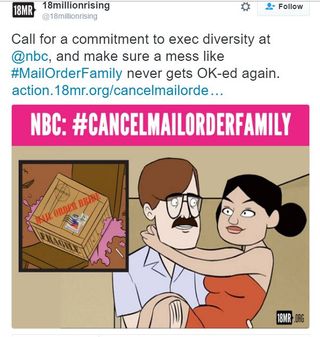Relationships
Five Lessons We Learned from the “Mail Order Family" Fiasco
Some recommendations to responsibly address Hollywood's "Diversity Problem."
Posted October 1, 2016
This piece was written in collaboration with Dr. Alicia del Prado - psychologist, professor, and co-chair of the Asian American Psychological Association's Division on Filipino Americans.
Two days ago, media giant NBC Universal was about to develop a comedy television show featuring a widowed White man who orders a “mail-order bride” from the Philippines through a catalog so that the woman can raise his children. The show was supposed to be based on producer and writer Jackie Clarke’s real-life experiences with her father who bought not one but two mail-order brides from the Philippines! Indeed, according to Jackie Clarke, her father “…ordered another mail-order bride without divorcing the first one.” Jackie Clarke further added that her father used to say things like “Prostitutes are fun to talk to” and that he lives in the Philippines now “so he has all of these relationships with prostitutes, but…he doesn’t sleep with them” because he doesn’t want to “catch syphilis or anything." Jackie Clarke says that her father is in the Philippines “for the women” and that he lives “like a king…as a middle-aged, Caucasian, attractive, 62 year-old” man.

The show – titled “Mail Order Family” – was going to be about this man and his antics, which Jackie Clarke appears to find very funny. Apparently, so did NBC, which led to the greenlighting of the show.
The announcement that the project was moving forward caused immediate and widespread outrage from the Filipin@ and Asian American community, and beyond. This backlash, in turn, led to NBC canceling the show before it even got started.
This outcome is great for the community, but how do we make sure that it doesn’t happen again? The answer, of course, is not to avoid telling Filipin@ stories altogether. We sure hope that this doesn’t result into simply excluding Filipin@ stories from future projects. We certainly hope that the answer is not to further exacerbate the invisibility of Filipin@s in mainstream Hollywood.
The answer we should arrive at, we hope, is to learn from this terrible mistake and do better next time. So what have we learned? Below we offer five lessons that we hopefully have learned from the “Mail Order Family” debacle.
1. Don’t reinforce demeaning and dehumanizing stereotypes about people who are demeaned and dehumanized in real life. In case some folks may not know, many American men have strong fetishes for “Asian” women. Research suggests that such a fetish – often referred to as “yellow fever” – is most common among White men who are driven by power and privilege and who believe Asian women would make perfect submissive wives who would cater to their every desire. Therefore, displaying a “mail-order bride” on TV does nothing but to cater to many White men’s fetishes and to further propagate inferiorizing, denigrating, and dehumanizing racist, sexist, misogynist stereotypes, making such stereotypes “normal” and acceptable. Filipinas in the U.S. occupy many roles, and they have been fighting against denigrating stereotypes about Filipinas for generations. Many Filipinas also are in respectful, consensual interracial relationships, and these relationships are overlooked and minimized when exotification and stereotypes are privileged. Exposure to oppressive stereotypes, in turn, is related to various negative outcomes for individuals and communities! And with Filipin@s already being invisible in mainstream TV as it is - if the only image/representation of Filipin@s to mainstream America is an inferiorizing, denigrating, and dehumanizing one - then it doesn’t help our community at all. Essentially, all NBC was about to do is use their platform, art, and influence to further the oppression of Filipin@s. Should Filipin@s be happy – thankful even – that at least there will be Filipin@ representation in mainstream TV? Nah, we want representation but not the demeaning, insulting, and dangerous kind. Hopefully, producers, writers, and media networks can use their talents, power, and influence to break stereotypes instead.
2. Don’t trivialize, make light of, or laugh at serious real-life issues. Related to number 1 above, the fact that the show was about “mail-order brides” isn’t inherently problematic; the problem is that the show was going to be a comedy and so it turns serious problems like yellow fever, the objectification of women, and the “mail-order bride” phenomenon into something trivial, funny, and unimportant. The problem is that it ignores the ugly historical, political, and economic conditions of imperialism, colonialism, and neocolonialism that impoverish Filipin@ people and force so many Filipinas into this situation. The problem is that it hides the fact that “mail-order brides” are especially at risk for exploitation, violence, and abuse. There are very serious real-life challenges that are facing real-life “mail-order brides,” so by all means, develop a TV show for mainstream America that focuses on the lived realities of “mail-order brides.” Tell their stories of struggles, hardships, and losses, as well as their stories of resilience, success, and joys. But not as a comedy. Give people’s struggles and truths the validity and dignity they deserve. Also, if the focus of the show was not even the “mail-order bride” but the White family who ordered a “mail-order bride,” then it’s even worse because the “mail-order bride” pretty much becomes nothing but a prop or background context for yet another White family to be funny in. So, please don’t just use our struggles simply as background. Instead, we hope you use your platform to help us bring serious awareness and solutions to the issues we face.
3. Don’t forget to collaborate with people from the community. Another huge problem with “Mail Order Family” is that it was created without Filipin@ collaboration. Related to number 2, if one decides to tell Filipin@ stories, please do it in a respectful, delicate, and accurate manner, and you cannot do this without input and collaboration from the people with lived experience. As we have been hearing a lot lately, Hollywood overall has a serious diversity problem. Most recently at the Emmy’s Alan Yang and Aziz Ansari even called on Hollywood for improved representation of the 17 million Asian Pacific Islander Americans (APIA). Well guess what, 20% or one out of five of those 17 million are Filipin@s! Even within the sad state of APIA representation in Hollywood, Filipin@s are even more pathetically invisible despite their large numbers, long history with the U.S., and unique experiences! And then when we finally get represented, it is in such a problematic way – a representation that only reinforces the inferiorizing, denigrating, disrespectful, fetishizing, and dehumanizing stereotypes that our community has been struggling to fight forever! The further subjugation of the Filipin@ community that “Mail Order Family” was dangerously close to doing – whether intentional or not – is what happens when things are done without the collaboration and input of the community it was purporting to portray. So if NBC and Jackie Clarke are serious about not being part of this diversity problem, then this is a great opportunity to truly do something about it. Put in serious work and money toward increasing the representation of Filipin@s in mainstream media. What we mean about “serious work” is they need to involve the Filipin@ community in these efforts to make sure that the nuance, complexity, and diversity of the Filipin@ experiences are respectfully, delicately, and accurately told. Collaborate with the Filipin@ community. Include us in all stages of the process. Nothing about us, without us.

4. Don’t ever think that it is acceptable and funny for a White American family to buy brown-skinned human beings from a country that was colonized, exploited, and ravaged by the United States. EVER. We thought this was a clear no-brainer, but given the audacity of “Mail Order Family,” we figured we need to continue being explicit and clear about this. First – haven’t we learned anything about slavery? It is unfathomable in the year 2016 that there is a version of one human purchasing another human that is still deemed acceptable and funny. Second – haven’t we learned anything about colonization? U.S. colonialism left ugly economic and psychological scars in the Philippines and among Filipin@s, all of which combine to create a matrix of reasons for why many Filipinas are forced (or convinced, persuaded, nudged, coerced?) to engage in actions that may lead to them becoming “mail-order brides.” Third, haven’t we learned anything about the difficult, painful, and even traumatic realities of immigrants? Immigrants face a wide array of very real and serious challenges as they adjust to a new language, new country, new culture, and – for “mail-order brides” – new relationships and families! It is insulting that NBC and Jackie Clarke can just so casually but blatantly ignore such painful realities and even deem it acceptable to laugh at, make light of, and profit from. Just don’t do this. Ever.
5. Don’t minimize, rationalize, and brush off the concerns you hear from the community. Finally, there were some folks who suggest that it is not NBC’s nor Jackie Clarke’s intention to offend anyone, and that perhaps the outraged people are just being overly sensitive. Look, maybe it is not their intention to be racist, but people sometimes end up doing racist things even when they don’t intend to. In fact, even good people who are well-intentioned may still hold biases and still end up behaving in ways that are hurtful to a particular social group. We all make mistakes, and sometimes the mistakes we make end up hurting people even when that’s not our intention. When that happens, we shouldn't go to the people we hurt and say “Hey, you don’t have a right to be hurt. You totally misunderstood me. It’s not my intention to hurt you. Besides, what I did is not even really hurtful to you.” We shouldn't blame the people that we hurt for being hurt. Instead, when people tell us that we have hurt them, we should try to listen to them, to hear them, to improve our understanding of their experiences, so that we will know better. Then, once we know better, let's do better.
Just about a day after the backlash, NBC announced that "the writer and producers have taken the sensitivity to the initial concept to heart and have chosen not to move forward with the project at this time." This appears to be a good start, and we appreciate that. But we also hope that they talk to Filipinas, to real-life “mail-order brides,” to Jackie Clarke’s stepmom. We hope Jackie Clarke and NBC listen to our community - the community they were intending to laugh at and profit from, the community they ended up hurting, and the community that they found out will not put up with any undignified representation of their lives. I hope they hear us, so that they will know better. Then, hopefully, they will do better.
Again, nothing about us, without us.
~~~~~~~~~~~~~~~~~~~~~~~~~~~
E. J. R. David, Ph.D., is an Associate Professor of Psychology at the University of Alaska Anchorage. His work on the psychological experiences of marginalized peoples has resulted into two books, "Internalized Oppression: The Psychology of Marginalized Groups" and "Brown Skin, White Minds: Filipino American Postcolonial Psychology." Learn more about his work here or follow him on twitter.
Alicia del Prado, Ph.D., is a tenured faculty member for the clinical psychology doctoral program at the Wright Institute in Berkeley, CA. Dr. del Prado is currently the Co-Chair of the Asian American Psychological Association’s Division on Filipino Americans. She specializes in the application of cognitive behavioral therapy grounded in a collaborative, culturally competent framework with college students, professionals from diverse backgrounds, individuals with multiracial heritage, and Filipino Americans. Learn more about her work here or follow her on twitter.




